|
|
|
Sort Order |
|
|
|
Items / Page
|
|
|
|
|
|
|
| Srl | Item |
| 1 |
ID:
046266
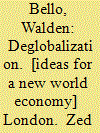

|
|
|
|
|
| Publication |
London, Zed Books, 2002.
|
| Description |
xi, 132p.
|
| Standard Number |
1842773054
|
|
|
|
|
|
|
|
|
|
|
|
Copies: C:1/I:0,R:0,Q:0
Circulation
| Accession# | Call# | Current Location | Status | Policy | Location |
| 046247 | 337/BEL 046247 | Main | On Shelf | General | |
|
|
|
|
| 2 |
ID:
141937
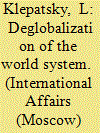

|
|
|
|
|
| Summary/Abstract |
THE PRESENT transitory post-bipolar world system manifests several trends: globalization, transformation of international relations, gradual shift toward a multipolar world and the emergence of new centers of a future world order. These and other trends of the transitory period have been exhaustively described in academic and political writings. The sum-total of factors responsible for the essence and the far from simple nature of current transformations require further specification and even more comprehensive analysis. The polycentric nature of international relations is not a recent phenomenon yet the present stage of its development goes to the depths where the so far practically indiscernible elements of a future world order are taking shape. The transitory period of the post-bipolar world has not yet ended. The theory of international relations has no use for the "transitory period" category and its highly specific historical content: Indeed, the bipolar world system took some time to develop after 1945. The transitory period is characterized by an intertwining of old and new elements and factors that, on the one hand, ensures continuity of international relations and, on the other, creates the outlines (configuration) of a new world order.
|
|
|
|
|
|
|
|
|
|
|
|
|
|
|
|
| 3 |
ID:
180760
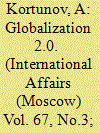

|
|
|
|
|
| Summary/Abstract |
HUMANITY is going through a painful process of deglobalization. Whetherthis process is inevitable or not (and if not, then who is responsible for it) is a matter of debate. In any case, the global financial crisis of 2008-2009 and the postcrisis period of 2010-2013 made it abundantly clear that globalization's linear development, to say nothing of its exponential development, is a thing of the past. Certain parameters of interconnection, such as international trade and direct foreign investment volumes, managed to recover by the middle of the 2010s, only to collapse once more at the end of that decade. Today, centrifugal processes have already gathered a lot of inertia. This means that those who expect that some single event (even a very significant one, such as Joe Biden taking office in the United States) may stem the process, let alone reverse it, are indulging in wishful thinking.
|
|
|
|
|
|
|
|
|
|
|
|
|
|
|
|
| 4 |
ID:
180364
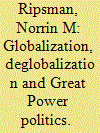

|
|
|
|
|
| Summary/Abstract |
Commercial liberalism would suggest that whereas globalization was conducive to great power cooperation—or at least moderated competition—deglobalization is likely to ignite greater competition amongst the Great Powers. In reality, however, the picture is much more complex. To begin with, the intense globalization of the 1990s and 2000s is not responsible for moderating Great Power tensions; instead, it is itself a product of the security situation resulting from the end of the Cold War. Furthermore, while globalization did serve to reinforce cooperation between the United States and rising challengers, such as China, which sought to harness the economic gains of globalization to accelerate their rise, it also created or intensified fault-lines that have led to heightening tensions between the Great Powers. Finally, while we are currently witnessing increasing tensions between the US and both China and Russia, deglobalization does not appear to be the primary cause. Thus, geoeconomic conditions do not drive security relations; instead, the geoeconomic environment, which is itself influenced by Great Power politics, is better understood as a medium of Great Power competition, which may affect the character of Great Power competition and its intensity, but does not determine it.
|
|
|
|
|
|
|
|
|
|
|
|
|
|
|
|
| 5 |
ID:
180372
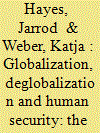

|
|
|
|
|
| Summary/Abstract |
Increased nationalism, greater protectionism and a gradual move away from a rules-based international order by some members of the international community do not bode well for vulnerable populations around the globe. Human security is threatened by a host of non-traditional security challenges catalysed by the growth of physical technologies and require multifaceted responses from a variety of actors. Many of those actors look to transnational networks built on globalized liberal order's social norms—what we call social technologies—for protection. The dwindling interconnectedness of deglobalization is likely to further empower corrupt governments at the expense of vulnerable citizens. This results from a decreased willingness by states and international institutions to defend human security. Whether one looks at the plight of persecuted citizens during Burma's military junta, human slaves in the fisheries off the coast of Indonesia, or farmers uprooted from their land by palm oil plantations, without social technologies to counterbalance the negative implications of physical technology the international community will lack the political capacity (sanctions, arms embargoes, travel restrictions, etc.), to aid those most in need. Ultimately, the effects of deglobalization on human security will depend largely on the trajectory of social technology developing alongside advances in physical technology.
|
|
|
|
|
|
|
|
|
|
|
|
|
|
|
|
| 6 |
ID:
180378
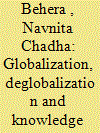

|
|
|
|
|
| Summary/Abstract |
Although globalization processes have brought the world closer through the exchange of knowledge, ideas and practices, advances in knowledge dissemination have not been mirrored by expansion in sites and modes of knowledge production. This article probes this disjuncture and asks how deglobalization might chart different pathways by delving into the intellectual history of the making of International Relations (IR). Focusing its gaze on the structuring principles of knowledge creation and modes of knowing rather than specific issues and problematiques of IR, it analyses the historical impact of western Enlightenment thinking through centuries-long imperialism, which continues to limit the agency of many states in the re-making of their life-worlds. The article describes deglobalization as a longue durée historical response that offers different possibilities for countering or challenging the discursive hegemony of the ‘West’. It discusses a ‘nationalist’ response by China—a rising power and a more dispersed, global academic endeavour seeking to decolonize IR's modes of knowledge production to better account for the diverse ground realities of its many worlds.
|
|
|
|
|
|
|
|
|
|
|
|
|
|
|
|
| 7 |
ID:
180379
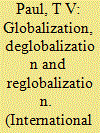

|
|
|
|
|
| Summary/Abstract |
Liberalism has been the most successful political ideology during the past two centuries in withstanding challenges and adapting to new environments. The liberal international order, set up after the Second World War and strengthened at the end of the Cold War, is going through a series of crises, propelled by deglobalization pressures, and the rise of illiberal and populist leaders, all challenging the three pillars of the liberal order: democracy, economic interdependence and international institutions. Two critical reasons for the decline of the liberal order are internal in terms of income distribution and institutional malaise. The article argues that the demise of the liberal order is not inevitable provided liberal states take remedial measures and adapt to the new environment as they did in 1919, 1930s, the second half of the 1940s, 1960s and 1991. Reformed globalization, or re-globalization is essential for facing the geopolitical challenges emanating from China and other illiberal states. The inability of other systems to offer both prosperity and freedom that the liberal order can provide is its main attractiveness. The connection between internal reforms in liberal states to address deepening inequalities and wealth distribution, a by-product of intensified globalization, and the prospects of liberal order's success is highlighted. The need for a refined welfare state taking into account the new realities to tackle the internal challenges is proposed.
|
|
|
|
|
|
|
|
|
|
|
|
|
|
|
|
| 8 |
ID:
180363
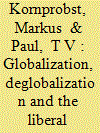

|
|
|
|
|
| Summary/Abstract |
For decades, globalization and the liberal international order evolved side by side. Recently, however, deglobalizing forces have been on the rise and the liberal international order has come to be increasingly beleaguered. The special issue ‘Deglobalization? The future of the liberal international order’ examines the interconnectedness of globalization and deglobalization processes on the one hand and the trajectory of the liberal international order on the other. This introduction provides a conceptual frame for the articles to follow. It discusses globalization and deglobalization processes, compares how they have been intertwined with the liberal international order in the past and presently, and explores how these differences are likely to affect the future of world politics. The special issue makes three important contributions. First, we examine globalization and deglobalization processes systematically. Second, we break new ground in studying the future of international order. Third, we generate novel insights into epochal change.
|
|
|
|
|
|
|
|
|
|
|
|
|
|
|
|
| 9 |
ID:
164961
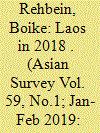

|
|
|
|
|
| Summary/Abstract |
As usual, there is mostly continuity in Laos: solid economic growth, a strong ruling communist party, increasing dependence on China, growing inequality, and tight control of civil society. A new trend, apart from the return of a socialist rhetoric, is an official appraisal of self-sufficiency and anti-globalization.
|
|
|
|
|
|
|
|
|
|
|
|
|
|
|
|
| 10 |
ID:
186927
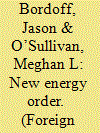

|
|
|
| 11 |
ID:
189694
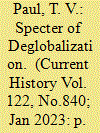

|
|
|
|
|
| Summary/Abstract |
The post-Cold War era witnessed intense globalization, evident in expanding links between countries in economic, technological, demographic, and cultural areas. Today there is increasing fear that globalization is being replaced by rising nationalism, protectionism, territorial aggrandizement, and a new form of Cold War marked by contestation over great power spheres of influence. Although many tendencies to deglobalization are present, they have not yet brought about a complete breakdown of the globalization process, and the power of antiglobalization forces may be overstated. Parallel trends suggest that a form of “truncated globalization” may be emerging, even as antiglobalization backlashes continue in some domains.
|
|
|
|
|
|
|
|
|
|
|
|
|
|
|
|
| 12 |
ID:
180761
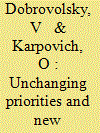

|
|
|
|
|
| Summary/Abstract |
RUSSIA strives to act as constructively as possible in the international arena" - this is one of the most significant statements that Russian Foreign Minister Sergey Lavrov made at an annual press conference on the results of Russian diplomacy [2]. And it is fundamentally important today, when major changes in the global situation, triggered this time by the coronavirus pandemic, have made it an urgent task for international actors to develop the most rational approaches to the new challenges and to ensure national interests in the new situation.
|
|
|
|
|
|
|
|
|
|
|
|
|
|
|
|
|
|
|
|
|